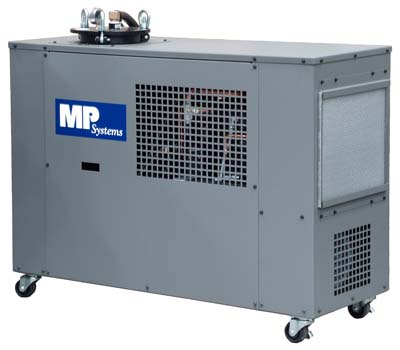S2 Coolant System/Chiller Unit
S2 Coolant System/Chiller Unit
MP Systems Inc. has launched its first integrated chiller and high pressure coolant system.

MP Systems Inc. has launched its first integrated chiller and high pressure coolant system. The all-in-one system, named the "S2," was developed specifically for the metal cutting industry, accommodating the growing need for high pressure, stabilized coolant to help maintain the tight tolerances of many parts.
"We dedicated a substantial amount of time developing the S2," says Mike Sayers, General Manager of MP Systems. "We believe we have solved all of the problems associated with other coolant chiller products currently available, including a space-saving design, optimal flow, real-time monitoring, and tidy hose routing."
The S2 can be integrated with most types of CNC machine tools, including machining centers, turning centers, and Swiss-style lathes. Either water or oil-based coolants may be used.
Real-time monitoring is managed by the S2's PLC (Programmable Logic Controller). The PLC directs the S2 to respond to changing conditions, such as air and tank temperatures and the outgoing coolant temperatures from the machine tool. The compact system stabilizes coolant to +/- 1 degree of ambient temperature. The controller also provides average temperature readings, eliminating random spikes or drops in temperatures.
A 7-day timer clock, an exclusive S2 feature, allows users to circulate and establish the coolant temperature in the machine tool tank up to one hour before starting the machine. This functionality decreases the wait time for the fluid to reach the desired temperature prior to cutting operations. The timer clock has two options, a Monday to Friday setting and a Saturday to Sunday setting to accommodate all shifts, including those that are "lights-out."
To help keep the shop floor neat and orderly, the S2 has a remote valve block. The manifold block may be mounted neatly on the machine with just one high pressure hose leading to the S2. This single-hose, remote manifold option addresses the clutter and safety risk of having multiple lines laying on the floor for multi-port and Swiss-type applications.
A built-in feed pump supplies the chiller and high pressure pump with optimum flow. It also accommodates aerated fluid exceptionally well, according to Mr. Sayers. When used with water-based coolant, the S2 pumps up to 1000 psi at 8 gallons per minute. With oils, it reaches up to 2000 psi at 5 gallons per minute.





